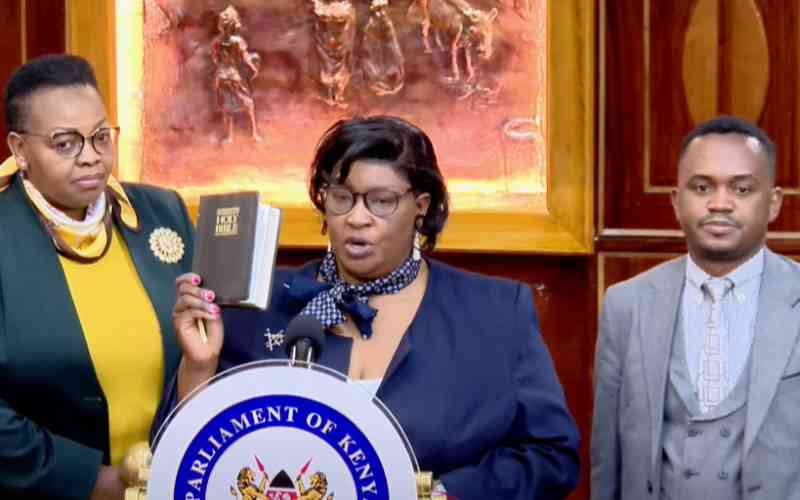Billion-Dollar Nightmare: Ghost Schools Haunt Nation's Education Funds!

Kenya is currently facing a confluence of significant national challenges, marked by a widespread education funding scandal, escalating concerns over police brutality, and a high-profile defamation court ruling. These events collectively highlight critical issues within the nation's governance, public services, and legal framework, drawing widespread public and parliamentary attention.
At the heart of one major crisis is a vast education funding scandal, meticulously uncovered by Kenya's Auditor General, Nancy Gathungu. Her special report, presented to the National Assembly Public Accounts Committee (PAC), revealed alarming irregularities within the National Education Management Information System (NEMIS) between 2020 and 2024. The audit detailed the fraudulent disbursement of KSh3.7 billion in capitation funds, with 723 out of 1,039 sampled schools implicated in these irregularities. Shockingly, 33 non-existent institutions continued to receive state funding, siphoning off billions while legitimate operational public schools are struggling with a severe funding deficit of KSh117 billion. This deficit disproportionately affects secondary schools but also impacts primary and junior institutions. The report further exposed issues of accountability, noting that some operational schools had their funds mixed in single bank accounts. It also raised concerns about the equity of the capitation funding model, which fails to adequately address the varying needs of different schools. In response to these revelations, Members of Parliament have vehemently called for urgent and comprehensive reforms to the flawed NEMIS system, with some accusing the Ministry of Education of operating more like a business than a public service, potentially disadvantaging certain regions.
Concurrently, Kenya is grappling with intense public outrage over incidents of police brutality and the use of excessive force during recent demonstrations. In response to mounting public outcry, Interior Cabinet Secretary Kipchumba Murkomen has announced forthcoming plans for a formal directive. This directive, based on Article 245(4) of the Constitution, will regulate the use of force by police officers, particularly concerning suspects, and is slated for publication in a gazette notice. This policy shift follows tragic events, including the death of 23-year-old James Wambugu Gachara, a Form Three student, who was fatally shot by anti-riot police on July 7, 2025. James was walking home from school in Nanyuki, far removed from any protest activity, when he was hit by a live round near the Nanyuki Law Courts. The incident was captured on a viral video, and a postmortem revealed a catastrophic, close-range gunshot wound to the pelvis. While Murkomen had previously advocated for strong actions against those attacking police stations, he has now clarified that any officer found to have unlawfully used force would face legal consequences, promising thorough investigations and disciplinary actions for excesses. These nationwide demonstrations, held on June 25 and July 7, 2025, were described by Murkomen as involving “raw and unprecedented terror” by violent elements.
Adding to the nation's complex legal landscape, a significant defamation ruling has recently been handed down. Former nominated senator Gloria Orwoba has been ordered to pay KSh10 million to Senate Clerk Jeremiah Nyegenye for defamation. The ruling, delivered by Milimani Commercial Court Magistrate Ruguru Ngotho on July 14, 2025, found Orwoba's social media statements—which falsely accused Nyegenye of sexual harassment—to be defamatory, malicious, and not protected by parliamentary privilege. Nyegenye had consistently and vehemently denied these accusations. Beyond the monetary penalty, the court has mandated Orwoba to issue a formal apology to Nyegenye through her social media platforms and in a national newspaper within 30 days. Failure to comply will result in an additional KSh1 million fine, along with accruing interest. This judgment closely follows Orwoba’s recent expulsion from her position as a nominated senator.
Recommended Articles
UDA Loyalist Consolata Wakwabubi Joins Kenyan Senate, Pledges Service to Bungoma

A significant political and legal saga unfolds in the Kenyan Senate as Consolata Wakwabubi was sworn in on August 20, re...
Shocking Revelation: Billions Vanish in Ghost School Education Scandal!

Kenya is facing major national challenges, including a KSh3.7 billion education funding scandal involving ghost schools,...
Massive Scandal Uncovered: Billions Gobbled Up by Ghost Students and Non-Existent Schools!

Auditor General Nancy Gathungu has unveiled a massive KSh3.7 billion fraud involving ghost students and non-existent sch...
CHAN 2024 Grand Finale: Underdog Madagascar Clashes With Morocco For African Crown in Kenya

The TotalEnergies African Nations Championship (CHAN) PAMOJA 2024, co-hosted by Kenya, Uganda, and Tanzania, has been a ...
World's Best Hotel Revealed: Exclusive 18-Suite Oasis Crowned Top Destination
:max_bytes(150000):strip_icc()/TAL-lead-image-ANDBEYONDBATELEUR0725-79a09758093e4e65b08d747240497e1c.jpg)
Discover andBeyond Bateleur Camp, recently crowned the world's No. 1 hotel, offering an unparalleled luxury safari exper...
You may also like...
World’s Strongest Currencies Compared to the U.S. Dollar

The Dollar may be powerful, but it’s far from the strongest. See the top currencies in the world that outshine it, and w...
World’s Strongest Currencies Compared to the U.S. Dollar

The Dollar may be powerful, but it’s far from the strongest. See the top currencies in the world that outshine it, and w...
Why Do Africans Become More African After Leaving Africa?

Why do Africans abroad suddenly embrace their roots with pride? From Afrobeats in London to Yoruba weddings in New York,...
Boxing Icon's Son in Legal Turmoil: Julio Cesar Chavez Jr. Faces Cartel Allegations & Deportation Drama!

Mexican boxer Julio César Chávez Jr. has been deported from the U.S. to Mexico, where he was immediately jailed for alle...
Super Falcons Make History: Nigeria Crowned WAFCON Champions for 10th Time in Thrilling Win!
)
Nigeria's Super Falcons made history by clinching their 10th Women's Africa Cup of Nations title with a spectacular 3-2 ...
Paolo Sorrentino's 'La Grazia' Dazzles Venice, Earns Raves

Paolo Sorrentino's latest film, 'La Grazia,' captivated the Venice Film Festival, earning a four-minute standing ovation...
KPop Demon Hunters Ignites Oscar Buzz, Captivates Audiences

The animated film "KPop Demon Hunters" has emerged as a record-breaking global phenomenon, topping Netflix viewership ch...
Naira Marley Breaks Silence: Explosive Defense in Mohbad Case Rocks Nigeria!

Naira Marley has released a documentary sharing his side of the story regarding the tragic death of his former signee, M...